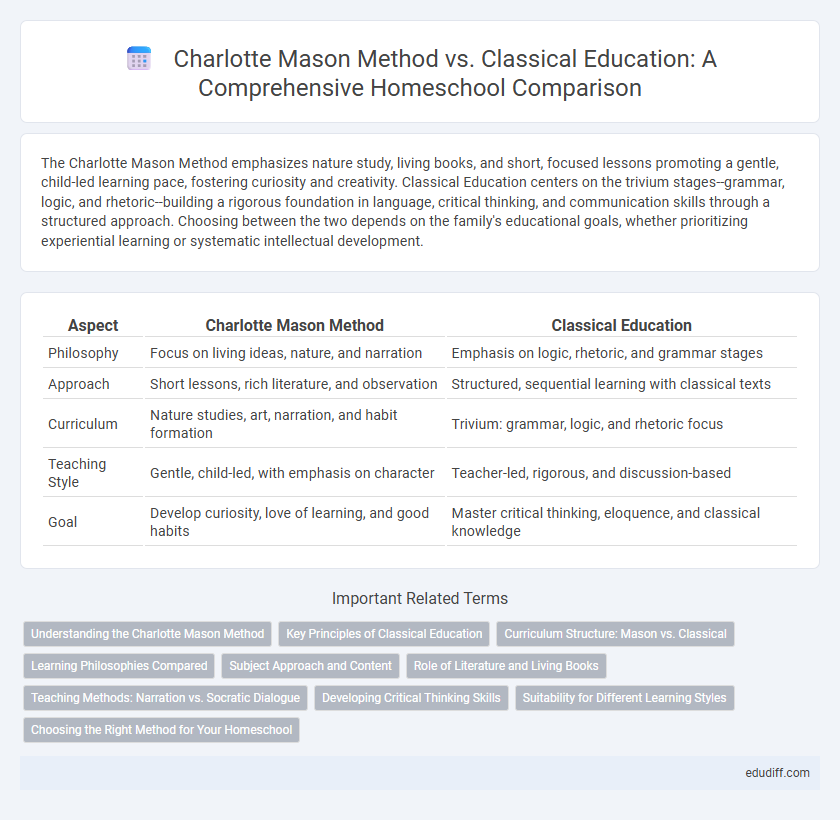The Charlotte Mason Method emphasizes nature study, living books, and short, focused lessons promoting a gentle, child-led learning pace, fostering curiosity and creativity. Classical Education centers on the trivium stages--grammar, logic, and rhetoric--building a rigorous foundation in language, critical thinking, and communication skills through a structured approach. Choosing between the two depends on the family's educational goals, whether prioritizing experiential learning or systematic intellectual development.
Table of Comparison
| Aspect | Charlotte Mason Method | Classical Education |
|---|---|---|
| Philosophy | Focus on living ideas, nature, and narration | Emphasis on logic, rhetoric, and grammar stages |
| Approach | Short lessons, rich literature, and observation | Structured, sequential learning with classical texts |
| Curriculum | Nature studies, art, narration, and habit formation | Trivium: grammar, logic, and rhetoric focus |
| Teaching Style | Gentle, child-led, with emphasis on character | Teacher-led, rigorous, and discussion-based |
| Goal | Develop curiosity, love of learning, and good habits | Master critical thinking, eloquence, and classical knowledge |
Understanding the Charlotte Mason Method
The Charlotte Mason Method emphasizes a living education through rich, narrative-rich literature, nature study, and short, focused lessons that cultivate a child's habits and character. Unlike Classical Education's structured trivium--grammar, logic, and rhetoric--the Charlotte Mason approach prioritizes gentle, holistic learning experiences that foster curiosity and critical thinking naturally. Understanding this method reveals its unique commitment to cultivating a love for learning by integrating art, music, and nature into daily lessons.
Key Principles of Classical Education
Classical education centers on the Trivium--Grammar, Logic, and Rhetoric--to develop critical thinking and effective communication skills systematically across stages. Emphasizing the Great Books and Socratic questioning, it fosters deep understanding and intellectual rigor in students. This method contrasts with Charlotte Mason's emphasis on living books and nature studies by prioritizing structured analytical frameworks and classical languages.
Curriculum Structure: Mason vs. Classical
The Charlotte Mason Method emphasizes a living books curriculum, focusing on rich, narrative texts and nature study to cultivate a child's curiosity and moral development. Classical Education presents a structured Trivium approach--Grammar, Logic, and Rhetoric stages--centered on mastering language, critical thinking, and persuasive communication. Mason's curriculum offers gentle, integrated learning with short, varied lessons, whereas Classical Education follows a rigorous, sequential progression emphasizing mastery and memorization.
Learning Philosophies Compared
Charlotte Mason Method emphasizes living books, nature study, and narration to cultivate a love of learning and critical thinking through rich, real-world content. Classical Education follows the trivium stages--grammar, logic, and rhetoric--focusing on structured knowledge acquisition, analytical reasoning, and persuasive communication. Both approaches value a rigorous education but differ in style: Charlotte Mason leans toward gentle, holistic learning while Classical Education prioritizes systematic intellectual development.
Subject Approach and Content
Charlotte Mason Method emphasizes living books and nature study, promoting rich, narrative-driven content in subjects like literature and history. Classical Education structures subjects around the trivium--grammar, logic, and rhetoric--focusing on sequential skill mastery and classical texts. Subject approach in Charlotte Mason encourages short, varied lessons with an emphasis on narration and observation, while Classical Education prioritizes structured analysis and critical thinking through classical languages and foundational Western literature.
Role of Literature and Living Books
The Charlotte Mason Method emphasizes the use of living books to engage students with rich, narrative-driven literature that fosters imagination and critical thinking, contrasting with Classical Education's reliance on classical texts and the trivium structure promoting analytical skills through reading original sources. Living books in the Charlotte Mason approach are chosen for their ability to bring subjects to life and inspire a love of learning, while Classical Education values foundational texts and philosophical works to build a comprehensive knowledge base. Both methods highlight literature's vital role but differ in book selection and pedagogical goals, tailoring the educational experience to distinct developmental outcomes.
Teaching Methods: Narration vs. Socratic Dialogue
Charlotte Mason Method emphasizes narration as a key teaching method, where children recount what they have learned to reinforce comprehension and retention. Classical Education relies on Socratic dialogue, engaging students through questioning to develop critical thinking and articulate reasoning. Both methods prioritize active student participation but differ in approach: narration fosters internalization through verbal expression, while Socratic dialogue cultivates analytical skills through guided inquiry.
Developing Critical Thinking Skills
The Charlotte Mason Method emphasizes developing critical thinking through narration, observation, and cultivating a habit of attention, enabling children to engage deeply with living books and nature. Classical Education fosters critical thinking by teaching the Trivium stages--grammar, logic, and rhetoric--encouraging students to analyze information, construct arguments, and express ideas clearly. Both approaches prioritize reasoning skills but differ in methodology: Charlotte Mason integrates these skills into daily life and narrative, while Classical Education uses structured philosophical and linguistic training.
Suitability for Different Learning Styles
The Charlotte Mason Method emphasizes living books, nature study, and short, focused lessons that suit hands-on and auditory learners, fostering creativity and practical knowledge. Classical Education prioritizes the trivium--grammar, logic, and rhetoric--benefiting analytical and verbal learners through structured, sequential learning and critical thinking exercises. Both methods can be adapted to various learning styles, but Charlotte Mason excels with kinesthetic and experiential learners, while Classical Education aligns well with those who thrive in a disciplined, logic-driven environment.
Choosing the Right Method for Your Homeschool
Choosing the right homeschool method involves understanding key differences between the Charlotte Mason Method and Classical Education. Charlotte Mason focuses on living books, nature study, and short, varied lessons to cultivate a love of learning, while Classical Education emphasizes the trivium stages--grammar, logic, and rhetoric--to develop critical thinking and eloquent communication. Tailor your choice based on your child's learning style, your educational goals, and the balance between creativity and structured reasoning you wish to achieve.
Charlotte Mason Method vs Classical Education Infographic

 edudiff.com
edudiff.com